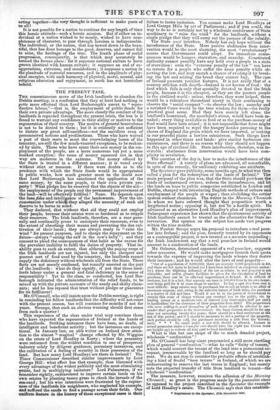TOPICS OF THE DAY.
SOCIAL PROGRESSION.
A VISION OF THE FUTURE.
AFTER the successful result of some great political movement, there is first a childish exultation; then a long pause of torpor and apathy ; then something which it has become fashionable to call reaction ; and then the hopes of the enthusiastic, the aspirations of the ambitious, the speculations of the theoretical, rush into a tu mult of conjectures as to what the next great political movement is to be.
The exultation consequent on the triumph of Free Trade is sub- siding ; the torpor and the apathy are already visible ; the reaction is approaching ; and the season of false or true prophecy regarding the future, and its primordial political changes, will not fail to come.
There are minds, however, that overleap all these intermediate steps ; and, with the keenness of the political gambler' or with the comprehensiveness of the philosophic idealist, already stand with impatient imagination in the presence of what they consider as destined to be the chief political struggle of the ag e that suc- ceeds the present.
Now, it is probable that, as respects England at least, we shall not have till more than half a century has elapsed, anything corresponding i in magnitude and intensity to the political con- tests, nor in importance to the political victories, which the last twenty years have witnessed ; and that political improvement must sink into the handmaid of social progression. It is evident to the philanthropist, that there are woes in the community which no government can heal ; to factions, that party cries have lost their charm, and party conflicts their excite- ment; to society, that it must be its own physician.
Statesmanship, therefore, must consist henceforth of the ability so to master and mould social elements as to evolve the largest amount of social good. And political education will inevitably be nobler in its aims and wider in its grasp than it has hitherto been. It will require, as before, practical qualities' an extensive and ma- ture experience, an early initiation into Parliamentary habits, into diplomatic subtleties and dexterities, into fmancial skill, and a thorough acquaintance with all which passes under the general name of routine : but it will also demand a pro- founder knowledge of human history and the human heart, such as the solitary student can best acquire. Now, here we have a revolution in statesmanship of the most momentous kind. For the instant you seek more from a statesman than ea -4 be learned in courts and parliaments, legislation ceases fze what it. has almost invariibly been in England, the cunning i appli- cation of a few aristocratic traditions ; and the power s at once taken from exclusively aristocratic hands. Consequently, when social progress begins to be the main inspiration and object of statesmanship, we arrive at that emancipation of talent for which many an earnest soul among our countrymen has so ardently sighed. Statesmanship for purposes principally political, requires simply shrewdness sharpened by exercise, and enlarged by collision with many persons and many things : of the quali- ties necessary for statesmanship of this description, the aristo- cratic class possesses a more abundant measure than all other. classes ; and thus it is not so much a misfortune as we think it that they have been our lawgivers so long. But statesmanship for purposes principally social, requires thought in the most sigm- ficant acceptation of the word : and therefore, it is to men of- business habits certainly, and of practical sagacity and prompti- tude, but who besides are philosophers, that we must after a short while look for our statesmen.
There are many enthusiasts who think that social progression will be much more beautiful than any aspect of political advance- ment; and they turn from the latter with a sort of disgust. But the first form of social progression will be a very prosaic affair. We may call it, for distinction's sake, the material phase. The objects of statesmen and philanthropists during this period will be social ; but they will involve only material changes, and be conversant only with material details. Numerous and sys- tematic efforts will be made to improve the material condition of the people ; but, whether a plan of national education be attempted or not, there will be nothing deserving the name of culture.
Then will come the second, or what we may designate the ter- thetie phase of social progression. With this, culture will begin. Comfort, material wellbeing, diffused in every mode that philan- thropy can suggest or government can aid, there will arise among - the people the taste for art and the love of the beautiful. This taste, this love, will be encouraged by the national instruments and es- tablishments of education. But the people will become their own educators in art, when the affection for art has become a hunger of the mind. And art can never be an agency to civilize, or art- ists do great things among a people, till art is felt to be an in- dispensable need of that people's heart. The good, the true, and the beautiful, are one. And after a feast of the beautiful, the cloyed spirit of the nation will yearn for something sterner and stronger than the beautiful can give. This will usher in the third or moral phase of social progression. This will be something as heroic as Puritanism, yet not expended like that noble fact in fierce antagonism, but in generous deeds of uni- versal blessing. The bravery of Puritanism was the result of deep faith. The bravery of the'period we are foretelling will be sympathy sanctified by the worship of the beautiful. A brave government and a brave people, acting under such influence and acting together—the very thought is sufficient to make poets of us all It is not possible for a nation to continue for any length of time this heroic attitude—such a heroic mission. But if either an in- dividual or a nation wished to be manly, wished to have com- pleteness of character, to pass through heroism is indispensable. The individual, or the nation, that has bowed down to the beau- tiful, that has done homage to the good, deserves, and cannot fail to seise, the heritage of the true. The fourth phase of social progression, consequently., is that which may accurately be termed the human phase : for it supposes national culture to have grown identical with human culture ; it supposes an end of ex- aggerations, extremes, and onesidedness ; it supposes a nation in the plenitude of material resources, and in the amplitude of phy- sical energies, with such harmony of physical, moral, mental, and religious education and enjoyment, as earth has not heretofore beheld.



























 Previous page
Previous page